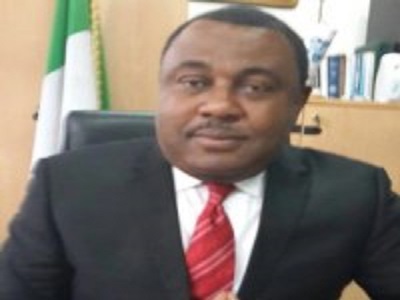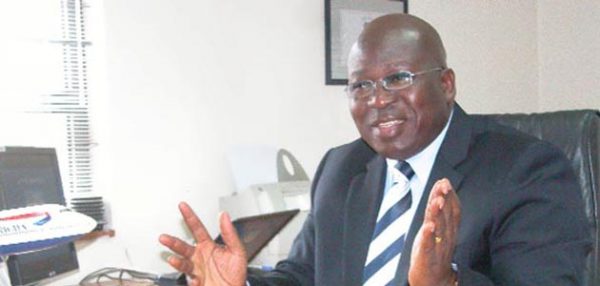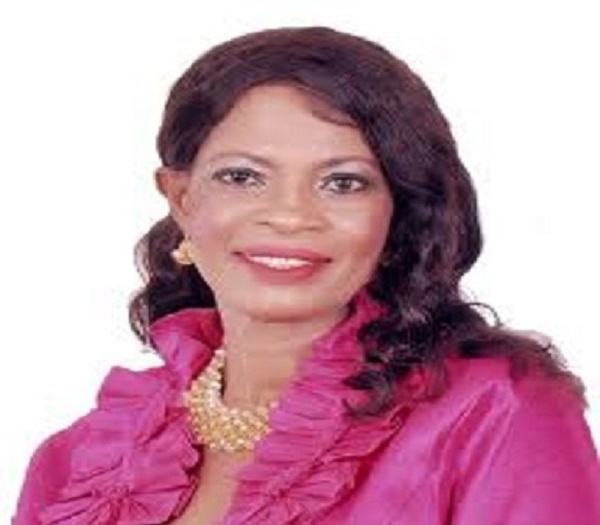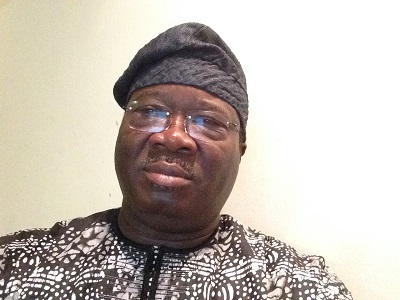I CARE INTERVIEW
Revenue Generation Isn’t The Core Mandate Of NIMASA – Jamoh
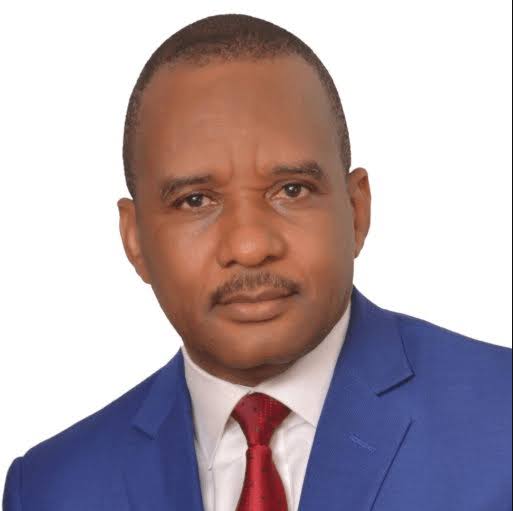
By Kenneth Jukpor
Dr. Bashir Jamoh is the Director General of Nigerian Maritime Administration and Safety Agency (NIMASA). As his administration clocked 100 days recently, he had a media parley where he unveiled the administration’s new agenda, recent strides and other maritime sector issues. Enjoy it.
Maritime Media
The role of the maritime media is very crucial and it is very difficult to measure the impact of the sector without the maritime media. I can’t think of another sector where the reporters make constant reportage of the sector like the maritime industry. You hardly see the impact of the journalists in Banking or Manufacturing sectors like Maritime. I want to sincerely appreciate the advancement and significant contributions you have made as journalists.
New Agenda
When the new executive management came in, we had to look at the mandate of the agency. We noted that we had to simplify the entire strategy into 3S. Maritime Security, Maritime Safety and Shipping Development. Under each gamut, we tried to evaluate what has been done so far and the next steps to take.
Maritime Security
We received a letter from the Presidency via the Ministry for a complaint that a vessel was attacked and they alleged that the Nigerian Navy didn’t respond to them. This came in on May 8, 2020. On May 19, 2020, we received another letter from the Secretary to the Government of the Federation (SGF) warning us that multinational companies trading on Nigerian waters like INTERTANKO, and other oil companies threatened to protest if we didn’t show seriousness in tackling our maritime security challenges within the nation’s territorial waters. We also responded to that and began to stem the trends of events.
Recall that the President, Muhammadu Buhari in June 2019 signed the Suppression of Maritime and other related Offences (SPOMO) Act into law. This is also known as the Anti-piracy Act which has set Nigeria apart as one of the few countries with a separate law to deal with piracy. The first thing we did was to develop guidelines and try to gazette the Act because in the past, we couldn’t try criminals without the Act.
We also proceeded to synergize our relationship with security agencies with similar functions. NIMASA doesn’t carry weapons, so whatever we had to do in terms of arrest of criminals has to do with intelligence gathering and working with the Nigerian Navy and Police. You would have observed that in the last two weeks I have visited the leadership of Nigerian Navy and Nigerian Police. We had very qualitative output which led to arrests of criminals. Prior to now, we haven’t had any arrest of pirates since 2016 and this gave the international community the impression that we weren’t serious in the fight against piracy.
Following the recent efforts and collaboration with the Nigerian Navy, we arrested ten pirates and foiled a lot of attacks. In some instances the pirates abandoned the ships and ran away. We also recorded seventeen additional arrests by the Nigerian Police. This makes a total of twenty-seven pirates arrested in the last one month. The persecution of these pirates with the SPOMO would begin next week. This development has already sent a good signal to the international community which led to the appreciation letter from the United Nations via the International Maritime Organization (IMO). They affirmed that we are changing the narrative on the issue of maritime security in the country.
The major issues we have observed in Nigeria in terms of maritime security has to do with lack of platforms, lack of synergy and coordination among the players. The issue of lack of platforms started in 1996 when most of our platforms were dispatched to Liberia to assist in fighting the Liberian war. We were unable to maintain most of these platforms during the war and by 1996 these vessels returned as rickety buckets. As the nation’s economy grew and the need for revenue increased across various sectors, our budget reduced significantly. We started experiencing shortage of infrastructure and platforms needed to fight piracy.
When Obasanjo came into power in 1999, he introduced Piccups to bring in platforms with a mandate that NIMASA, Nigerian National Petroleum Corporation (NNPC) and Nigerian Ports Authority (NPA) would finance it.
That contract was about £213million and the company started work, procuring some ships, aircrafts and armoured vehicles. However, they couldn’t complete the operation because of issues that had to do with transparency and corruption. Another administration came in, scrapped Piccups and replaced them with Global West.
Global West came with a different platform to take care of maritime security, enforcement, flag and port state control, collection of revenue, etc. Global West was encouraged to chase after ships involved in Ship to Ship (STS) transfer outside to come to Nigerian ports so that there was additional income shared in percentages between NIMASA and the company. However, if Global West couldn’t ensure an increase in revenue by upto 20percent, NIMASA had no business paying the company. That was how the contract was arranged. Under this platform, Global West procured about 25 vessels but there were lots of suspicious practices discovered by the Economic and Financial Crimes Commission (EFCC) in 2015. This infraction led to the interruption of the Global West business and most of the vessels are currently in the Naval dockyard.
After the investigation, EFCC would determine what would happen to those vessels. Part of the Global West agreement also stated that NIMASA would own the assets of Global West after ten years because it was a Public-Private Partnership (PPP). We believed that in ten years they would have recovered their investment on the vessels and made substantial profit. However, we never reached the ten year period so the vessels cannot be appropriated as
NIMASA’s property and the vessels can’t be put to use because of the ongoing investigation.
When the present Minister of Transportation, Hon. Rotimi Amaechi came onboard, we made our complaints because we had no vessels. The Navy also continued to complain because their budget is too low to acquire additional boats.
Subsequently, the Deep Blue Project came in and it brought a new proposal to get two special mission vessels that would take smaller vessels known as fast interceptor vessels into the high seas. In the event that there is any attack, the smaller interceptor vessels would be dispersed to check the infraction.
I’m happy to inform you that today we have received the two special mission vessels. The contract also provides for two special mission aircrafts and they would be due in August this year. We have to realize that these are equipment that you can just go and buy, you place your order and they are manufactured to meet the specific needs. We have received fourteen fast intercpetor vessels out of the seventeen. We have received thirteen armoured cars, remaining three. We also have the C4i centre for intelligence gathering. This C4i centre has been working for over a year and it assisted in getting the recent criminals apprehended. We have also discovered in the course of our collaboration that the Police has i24/7, NPA has C3i and the Navy has the Falcon Eye.
In a bid to synergize, we agreed that we would make these platforms interface with each other. NPA’s C3i gives one leeway to see whatever happens at the port areas. As you approach Nigerian ports, the C3i would capture whatever you do while NIMASA’s C4i can monitor up to the Exclusive Economic Zone (EEZ) which is about 200 nautical miles. The Navy’s Falcon eye also serves over and above what NIMASA sees. With the NIMASA gadget, we can also see wherever there is pollution. The system can capture what transpired.
This cooperation would help us change the narrative in the international community that has tagged Nigeria as the most dangerous trade area for shipping. This perception resulted in the extra war risk charges that everyone in Nigeria is made to pay because we are an import dependent country. This narrative must change because the charges are enormous. The last report of the International Maritime Bureau (IMB) still shows that Nigeria is the highest in terms of piracy on our waters.
Maritime Safety
We have a regional maritime coordinating centre. Whatever happens within the nine countries in the sub-region, Nigeria is the headquarters of that safety issue and search and rescue. When we came in, we had four different centres that take care of this issue. The first one is the Regional Maritime Coordination centre at our resource centre. All the equipment to engage a vessel in distress have been acquired and installed at the NIMASA Resource Centre.
You can get us when in distress and with the radar we have, we would be able to trace the position of that vessel and respond to the distress situation. The second station is at TaKwaBay and we have finished the process and installed the equipment. The delay in that centre is the foreign expatriate yet to programme the equipment before we can take off. The next one is at Oron and Bonny Escravos. Here the equipment has been imported but they are stuck in the United Kingdom because of the COVID-19 pandemic. As soon as the aviation sector is opened we would be able to take delivery of the equipment.
Shipping Development and Capacity Building
There are several angles to this. This area includes fleet expansion. The major challenge here is Cabotage and the Cabotage Vessel Finance Fund (CVFF). We have been having problems with disbursement of CVFF as we never disbursed the fund from 2003 to date. Since 1994, the government has set aside 30 percent of our revenue for fleet expansion. At that time, it was known as Ship Acquisition and Ship Building Fund. This fund was disbursed up to 1996 and there was some mismanagement and some of the stakeholders couldn’t repay the money to make it a revolving fund to expand our fleet. Consequently, the government suspended that initiative and we tried to recover the money between 1996 and 2003 to continue with such loans but we couldn’t.
However, in 2003 the Cabotage Act came in with a provision of CVFF to replace the former ship building fund. CVFF came with guidelines and the guidelines provided for the utilization of a primary lending institution which should be commercial banks. The idea was to introduce some level of professionalism in granting such loans and address the issues we faced with the initial ship acquisition fund. The CVFF guidelines turned out to be very stringent stating that NIMASA would have to provide 50 percent of the fund given to the beneficiary while his bank provides 35 percent and the owner 15 percent. For instance, if someone comes out with 15 percent of $5million for a vessel, you know that he is ready for that business. The bank would also provide the 35 percent with some guarantee before NIMASA provides the other 50 percent. NIMASA actually gives guarantee for the investment assuring the banks that it would provide 50 percent of the cost of the vessel if the ship owner fails to pay.
When we were about to disburse the CVFF, the policy of Treasury Single Account (TSA) came up and the monies had to go to TSA. The guidelines state that the bank must guarantee 50 percent and give 35 percent. If the money is not in the bank, how can the bank guarantee 50 percent and give 35 percent? The Minister of Transportation wrote to the President in November last year to get approval to disburse the funds, but we discovered that in view of this development that the monies weren’t in the primary lending institutions but Central Bank of Nigeria (CBN). Hence, it became very difficult to disburse. The Minister later instituted a Committee to look into the guidelines, review it and submit a report to be transmitted to the National Assembly for the amendment of the laws so that we can disburse the monies.
I am happy to tell you that we have concluded the review of the guidelines and we are set to submit the report to the Minister for onward transmission to the National Assembly.
Another issue under shipping development has to do with ship repairs. NIMASA procured a multi-billion floating dock to assist ship owners who sometimes have to take their vessels outside the country to dry dock. This modular floating dock is at Naval dockyard and we have been discussing with NPA to have the floating dock at Continental Shipyard because there is no better place to keep the facility.
We have an agreement with NPA in principle that we are going to move the floating dock to Continental Shipyard and manage it via PPP. NIMASA would own the floating dock but get consultants to manage the facility while NPA would come in with the Continental Shipyard facility and we would agree on the sharing formula. From estimates, we discovered that we can generate up to N13billion per month from the floating dock if it is fully in use. In addition to that, we are expecting employment opportunities for over 350 people and we intend to train some indigenous maritime students to learn in terms of apprenticeship and mechanical engineering from the floating dock.
The next thing has to do with ship building. We have some ship building facilities in Nigeria, but we are taking stock to know whether they are fully in use and to know their capacity. We want to know the capacity of each of the ship building facilities and the kind of assistance they require. From our preliminary investigation, we discovered that most of these facilities are producing lower level vessels because of the economic situation of the country and lack of spare parts and other materials. We are engaging the government to see how some fiscal incentives could be introduced for the materials they import to produce ships.
We intend to approach the CBN to provide some incentives for the ship building sector. In Nigeria, the manufacturing sector and agricultural sector get such incentives so the ship building sector also deserves similar incentives. The aviation sector also enjoys such incentives when importing their spare parts. These are the issues in shipping development.
We have established a Joint Working Group with a representative from the IMO, INTERTANKO, ICS, and other oil company conglomerates. Every month we hold meetings via Skype to discuss issues in terms of progress and challenges in the shipping sector. It was through one of such meetings that the appreciation of the UN via IMO came for our activities in recent times.
Seafarers Training
Sometime recently, I saw a front page report on MMS Plus newspaper on seafarers training. Subsequently, I called those concerned to confirm the veracity of the statement. If it is true that NIMASA made such a statement, then we have to defend it. I don’t want to give you an incorrect figure, but the ball is in our court to defend our submission.
NIMASA would give substantial information on the figures soonest, because the relevant departments say they have evidence that supports such claims.
This is a wake-up call for NIMASA to gather its documentation and be able to state the number of the Nigerian Seafarers Development Programme (NSDP) students that have graduated, the number placed on seatime and employment. However, I can assure you that two weeks ago, the executive management confirmed the employment of some of the seafarers. Those who performed wonderfully were employed as full-fledged staff of NIMASA. We will get back to you on other details soonest.
Revenue Generation
Revenue is important but it isn’t a core mandate of NIMASA. I can assure you that our main concern isn’t revenue but the 3s mentioned earlier. Maybe in the past we focused so much on revenue but today we have a situation where the international community is ready to swallow us for issues regarding maritime security.
We would get our revenue in the course of discharging our responsibilities. As we deal with the issue of security, we would collect revenue involved such as sea protection levy. In terms of Cabotage, we would collect our 2 percent surcharge. In terms of international shipping, we would collect the 3 percent levy.
We will deal with the Flag State and Port State issues and downplay the issue of revenue. However, I’m not saying that revenue isn’t important to NIMASA, but it is not the most important issue.

